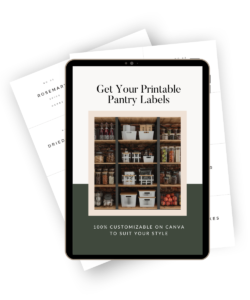Hey there, health-conscious friends! Are you worried about glyphosate in your food? You’re not alone. I know I sure am! Glyphosate, a common herbicide used in conventional farming, has been making headlines for all the wrong reasons. Let’s chat about what it is, why it’s a concern, and how you can avoid it to keep your family healthy and happy.
What’s the Deal with Glyphosate?
This harmful chemical, is a widely used herbicide, best known as the active ingredient in Roundup, a brand name of herbicide originally produced by Monsanto years ago, which Bayer acquired in 2018. It’s sprayed on crops to kill weeds, but unfortunately, it doesn’t just stay on the weeds. Residues can end up in the food we eat. Studies have linked it to various health concerns, including cancer, endocrine disruption, and environmental damage. Yikes, this is not something I want to be eating.
Which Food Brands Use Glyphosate?
You might be surprised at how many common household food brands have been found to contain glyphosate residues. Here are some to watch out for:
- General Mills: Cheerios, Nature Valley granola bars
- Kellogg’s: Corn Flakes, Frosted Flakes, Froot Loops
- Quaker: Quaker Oats, Quaker granola bars
- PepsiCo: Doritos, Tostitos, Lay’s
- Post Consumer Brands: Grape-Nuts, Honey Bunches of Oats
- Nestlé: Coffee-mate, Hot Pockets
- Mondelez International: Ritz Crackers, Triscuits
- Campbell Soup Company: Pepperidge Farm Goldfish, V8 juice
How to Avoid Glyphosate in Your Diet
Avoiding glyphosate might seem like a daunting task, but it’s doable with a few smart strategies:
1. Buy Organic Produce: Organic farming standards prohibit the use of glyphosate. Generally, by choosing organic fruits, vegetables, and grains, you can significantly reduce your exposure to this herbicide.
2. Grow Your Own Food: Have you ever thought about starting a garden? Even a small container garden on your balcony can yield fresh, glyphosate-free produce. Plus, gardening is a great way to relax and connect with nature. Recent studies have even shown that soil contains microbes that can have an anti-depressant effect on our bodies. As a result, don’t worry about a bit of dirt under your fingernails!
3. Check Food Labels: Look for certifications like “Non-GMO Project Verified” and “Certified Organic.” These labels indicate stricter controls over pesticide use, giving you peace of mind about what’s in your food.
4. Avoid Processed Foods: Processed foods, especially those with corn, soy, and wheat, are more likely to have it included in their ingredients. Alternatively, try to stick to whole foods whenever possible. Your body definitely will thank you!
5. Choose Glyphosate-Free Brands Some brands explicitly state that they do not use glyphosate in their products. A little research can go a long way. Support these brands and spread the word!
6. Filter Your Water: Did you know that tap water can sometimes contain glyphosate? Also, using a water filter that can remove it, such as a reverse osmosis filter, can help keep your drinking water safe.
7. Be Informed About Animal Products: Animals fed glyphosate-treated grains can accumulate it. Opt for organic or grass-fed meat, dairy, and eggs to minimize your intake.
Why Should You Care?
The potential dangers are serious business. Here’s a quick rundown of why you should care:
- Carcinogenic Potential: The International Agency for Research on Cancer (IARC) classified glyphosate as “probably carcinogenic to humans.” Studies have linked it to non-Hodgkin lymphoma and other cancers as a result of consumption.
- Endocrine Disruption: Glyphosate can interfere with hormonal systems, potentially affecting reproduction and development significantly.
- Environmental Impact: It harms non-target plants and wildlife and is linked to the decline of beneficial insects like bees and butterflies.
- Antibiotic Resistance: It can affect gut bacteria, thus potentially contributing to antibiotic resistance.
- Toxicity to Aquatic Life: Glyphosate entering water bodies can be toxic to fish and other aquatic organisms.
- Soil Health: It impacts soil microbial communities, essential for healthy soil and plant growth, circumstancially, y.
Undeniably, staying informed and proactive is the key to protecting your health. Choosing organic produce, growing your own food, and supporting glyphosate-free brands, can significantly reduce your exposure. Plus, understanding the potential dangers of glyphosate reinforces the importance of these choices for your well-being and the environment.
Stay healthy, stay informed, and happy eating!











 Don’t forget to grab your Free Pantry Labels! Fully editable on Canva to suit your personal design style!
Don’t forget to grab your Free Pantry Labels! Fully editable on Canva to suit your personal design style!
0 Comments